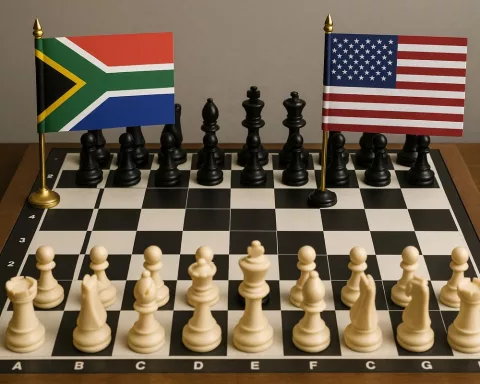Dr. Naledi Pandor, South Africa’s Minister of International Relations and Cooperation, highlighted the need for the G20’s engagement in global tensions and creating an equitable and sustainable planet in her recent G20 address. She discussed the G20’s founding objectives, current challenges, and the need for international reform and cooperation. Dr. Pandor advocated for increased financing and development support, combatting illicit financial flows, and unity and cooperation in addressing global issues. Her message serves as a powerful guide for the actions of the G20 nations and mirrors South Africa’s stance in the international community.
What were the key points of Minister Naledi Pandor’s G20 address?
Dr. Naledi Pandor’s G20 address highlighted the need for G20’s engagement in global tensions and the creation of an equitable and sustainable planet. She discussed the G20’s founding objectives, current challenges, and the need for international reform and cooperation. She advocated for increased financing and development support and urged for a united effort to combat illicit financial flows. Her message serves as a powerful guide for the actions of the G20 nations and mirrors South Africa’s stance in the international community.
I. G20’s Role in the International Arena
The G20 Foreign Ministers Meeting, a significant event in international politics, recently took place with South Africa’s Minister of International Relations and Cooperation, Dr. Naledi Pandor, playing a pivotal part in shaping the dialogue. Representing the Republic of South Africa, Dr. Pandor seized the opportunity to convey her viewpoints and worries, accentuating the need for G20’s engagement in global tensions and the creation of an equitable and sustainable planet.
Dr. Pandor kicked off her speech by expressing sincere gratitude towards the host of the meeting, the Brazilian Government. She underscored the fact that the African Union was participating in its inaugural G20 foreign minister’s conclave as a permanent member, a significant milestone for the continent’s countries.
Endorsing Brazil’s meeting theme – Building a Just and a Sustainable Planet – Dr. Pandor astutely acknowledged its relevance in the current world, which is dealing with a multitude of crises, from political conflicts to environmental concerns. She stood out because of her firm belief that the G20 nations, together with the invited guests, have an exceptional ability to propose viable solutions to these problems.
II. G20’s Core Objectives and Current Challenges
Dr. Pandor’s address was a compelling reminder of the G20’s founding objectives. Established with the aim of strategic cooperation, the G20 was devised to aid developing countries in overcoming poverty, inequality, and insecurity. She expressed her conviction that improving the world’s poorest people’s conditions is vital to maintaining the G20’s relevance.
When discussing the consequences of COVID-19, Dr. Pandor utilized the opportunity to convey hope and encouragement, highlighting the G20’s rejuvenated focus on development. This optimism, combined with a touch of realism, set the stage for her speech’s second segment.
Dr. Pandor openly discussed several tensions that have intensified over the past ten years. She talked about global trade tensions, the economic repercussions of COVID-19, continued terrorism, and extremism. She also emphasized the increasing debt burdens of poor and middle-income countries, feelings of exclusion and abandonment in certain regions, and breaches of international law, specifically referring to the Russia-Ukraine war and the recent Gaza conflict.
III. The Need for International Reform and Cooperation
Amidst these issues, Dr. Pandor highlighted the gradual erosion of trust between nations, which has hindered global collaboration on shared challenges. This decline in trust, coupled with a surge in competition, has underscored the pressing need for reforming international institutions to better tackle development issues.
In her address, Dr. Pandor asserted that the Bretton Woods institutions have shown greater responsiveness to development needs. However, she stressed that significant changes are still required to enhance and protect these improvements. She also mentioned the need for sustainable funding from the Multilateral Development Banks for developing countries to make progress with the Sustainable Development Goals (SDGs).
IV. Dr. Pandor’s Vision for Global Progress
Dr. Pandor advocated for increased financing and development support. She urged for a united effort to combat illicit financial flows, which intensify corruption, undermine the rule of law, and destabilize markets. She highlighted that the multifaceted and transnational nature of illicit financial flows necessitates a joint international initiative, and suggested that the G20 has the potential to play a significant part in this field.
In essence, Dr. Pandor’s speech was a plea for balanced and fair approaches to global issues, respect for differing opinions and beliefs, and an understanding that global entities are most successful when they act impartially. This message serves as a powerful guide for the actions of the G20 nations and mirrors South Africa’s stance in the international community.
V. An Appeal for Unity and Cooperation
Dr. Pandor, through her address, showcased the essential role that South Africa and other developing countries perform in the G20. Their voices, experiences, and perspectives are crucial in shaping international dialogue and decision-making. As the world wrestles with numerous challenges, it is hopeful that her appeal for unity and cooperation will be heeded by her G20 counterparts.
1. What were the key points of Minister Naledi Pandor’s G20 address?
Dr. Naledi Pandor’s G20 address highlighted the need for G20’s engagement in global tensions and the creation of an equitable and sustainable planet. She discussed the G20’s founding objectives, current challenges, and the need for international reform and cooperation. She advocated for increased financing and development support and urged for a united effort to combat illicit financial flows. Her message serves as a powerful guide for the actions of the G20 nations and mirrors South Africa’s stance in the international community.
2. What were the G20’s founding objectives?
The G20 was established with the aim of strategic cooperation and to aid developing countries in overcoming poverty, inequality, and insecurity.
3. What were the challenges discussed by Dr. Pandor in her address?
Dr. Pandor discussed several tensions that have intensified over the past ten years, including global trade tensions, the economic repercussions of COVID-19, continued terrorism and extremism, increasing debt burdens of poor and middle-income countries, feelings of exclusion and abandonment in certain regions, and breaches of international law.
4. What is Dr. Pandor’s vision for global progress?
Dr. Pandor advocated for increased financing and development support. She urged for a united effort to combat illicit financial flows, which intensify corruption, undermine the rule of law, and destabilize markets. She highlighted that the multifaceted and transnational nature of illicit financial flows necessitates a joint international initiative, and suggested that the G20 has the potential to play a significant part in this field.
5. What is Dr. Pandor’s appeal for unity and cooperation?
Dr. Pandor showcased the essential role that South Africa and other developing countries perform in the G20. Their voices, experiences, and perspectives are crucial in shaping international dialogue and decision-making. As the world wrestles with numerous challenges, it is hopeful that her appeal for unity and cooperation will be heeded by her G20 counterparts.
6. What is the significance of the G20 Foreign Ministers Meeting?
The G20 Foreign Ministers Meeting is a significant event in international politics, providing an opportunity for foreign ministers to come together and discuss global issues. South Africa’s Minister of International Relations and Cooperation, Dr. Naledi Pandor, played a pivotal part in shaping the dialogue, highlighting the need for G20’s engagement in global tensions and the creation of an equitable and sustainable planet.












